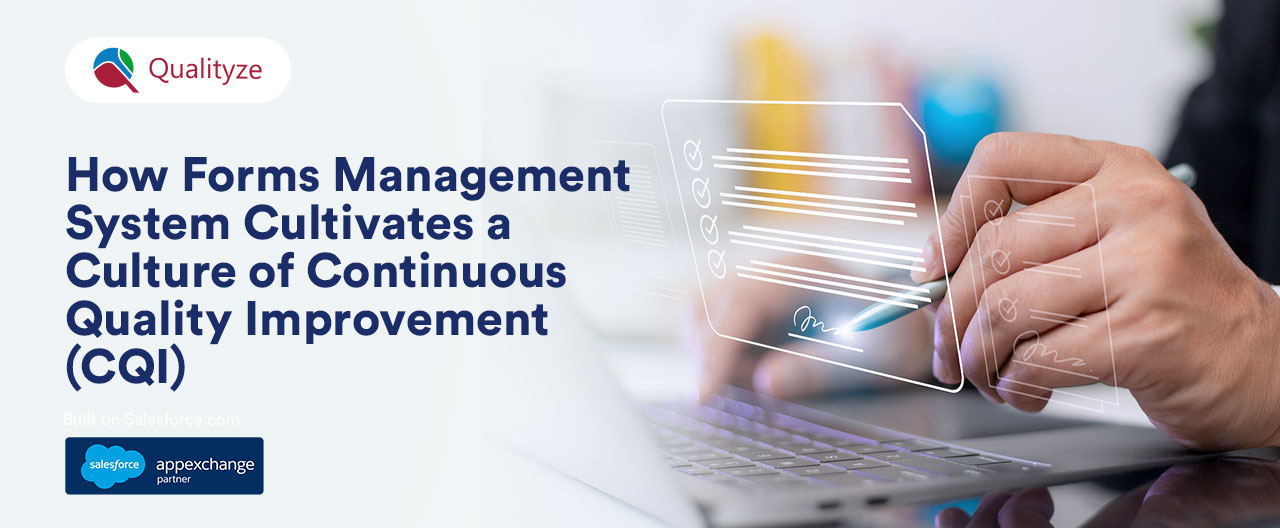

Calculate your potential savings with our ROI Calculator
ROI Calculator
Compliance is necessary for any business to succeed. Today, regulatory requirements have become stringent. Industries -- especially general manufacturing, medical device industries and pharmaceuticals -- must adhere to regulatory rules without deviation. However, compliance is not enough per se. Organizations increasingly recognize the value of cultivating a culture of continuous quality improvement (CQI). Continuous quality improvement prioritizes ongoing process optimization, error reduction, and a relentless pursuit of excellence.
How does a seemingly mundane task like forms management fit into the vision of uninterrupted quality improvement? As surprising as it may sound, effective forms of management can be a powerful catalyst for cultivating a robust CQI environment.
This blog discusses the Forms Management System's significant role in enabling uninterrupted quality improvement. We will also highlight the importance of quality culture and why prioritizing a future-ready quality environment over compliance is necessary to achieve business success.
Quality culture goes beyond ticking boxes and meeting regulatory requirements. It's about creating an environment where everyone—from top-level management to frontline employees—is committed to delivering value. Forms Management System is pivotal in enabling a quality culture by modernizing data management, documentation, etc. Here's what a quality culture includes:
Compliance ensures adherence to rules and regulations. Quality culture takes it further. Let's compare the two:
Many businesses view forms as a necessary tool to achieve meaningful results. However, companies fail to appreciate the true value of future-ready Forms Management System. A 2023 study found that 38% of organizations struggle with managing paper-based forms, leading to inefficiencies and errors. The compliance-centric approach, while crucial, falls short of cultivating a true CQI mindset. Here's why:
A robust quality culture reduces variability, modernizes processes, and improves product quality. Quality culture directly impacts patient safety.
By cultivating a culture of continuous improvement, organizations refine their processes. Refining processes enabled by a fool-proof quality culture leads to better therapeutic outcomes.
Quality excellence sets organizations apart, attracting customers and boosting market competitiveness.
By transforming forms management from a compliance afterthought into a strategic initiative, organizations can unlock their true potential for CQI. Here's how:
Related Article: Don't Let These 5 Form Design Mistakes Jeopardize Your QMS Automation!
Let's discuss in brief a few real-world examples to highlight the tangible impact of effective forms management on CQI:
Quality is subjective. Attributing value to it could be tricky. How can you measure the success of your forms management system in driving CQI? Here are some key metrics to track:
Technology plays a pivotal role in defining the business landscape. However, cultivating a true CQI culture requires a multi-layered approach. Here are some additional strategies to consider:
Effective forms management may seem like a boring administrative function, but it can act as a powerful catalyst for cultivating a culture of continuous quality improvement. Organizations can unlock many opportunities by leveraging technology to create dynamic forms, analyze data, and empower employees. CQI is a journey, not a destination. By embracing ongoing improvement, organizations can achieve operational excellence cost-effectively and efficiently.
Author

Qualityze Editorial is the unified voice of Qualityze, sharing expert insights on quality excellence, regulatory compliance, and enterprise digitalization. Backed by deep industry expertise, our content empowers life sciences and regulated organizations to navigate complex regulations, optimize quality systems, and achieve operational excellence.